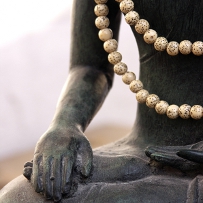|
|
|
|
|
 |

|

|

|
The greatest gift is the
gift of the teachings
|
|

|
| |
|
Dharma Talks
given at Spirit Rock Meditation Center
|
2009-10-11
Your Money! ...From Fear to Suffiency....
52:57
|
|
Mayuri Onerheim
|
|
|
What is your relationship to money? Are you afraid of "not enough"? Is money what you need to be happy? Money is so much a part of our psychology that the exploration of our relationship to money is essential for living our spirituality.
Mayuri Onerheim has been exploring the central role of money in our quest for consciousness, both as a CPA and Diamond Heart teacher. She states, "It is probable that the current chaos of our economic system will radically change the future and hopefully will ultimately support the evolution of humanity both culturally and spiritually." We can each participate in this evolution by moving out of* our fear, worry and obsession about money. We can release the fantasy of chasing after "more is better" and enter the reality of sufficiency and satisfaction.
The day will include mindfulness meditation practices and various forms of self-inquiry which support this transition, as well as practical tools. There will be periods of silence, as well as opportunities for questions.
|
|
Spirit Rock Meditation Center
|
|
|
|
|
|
|
|
|